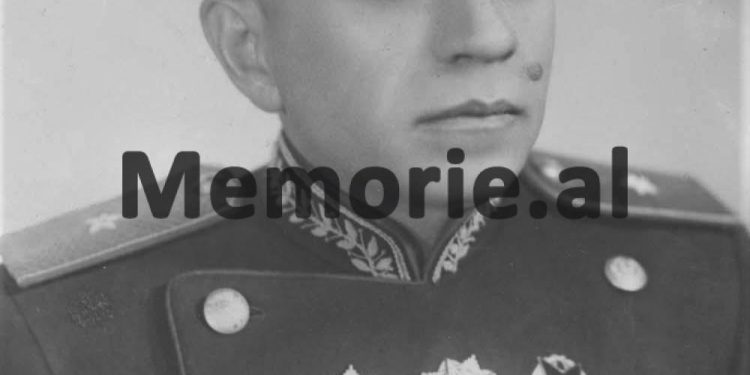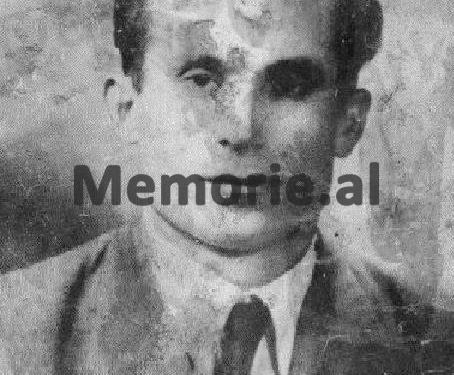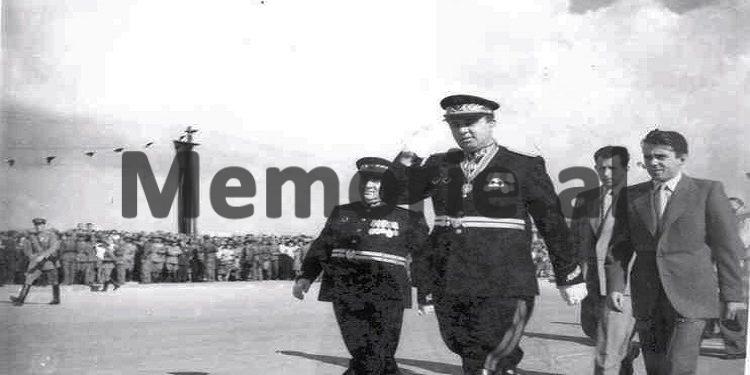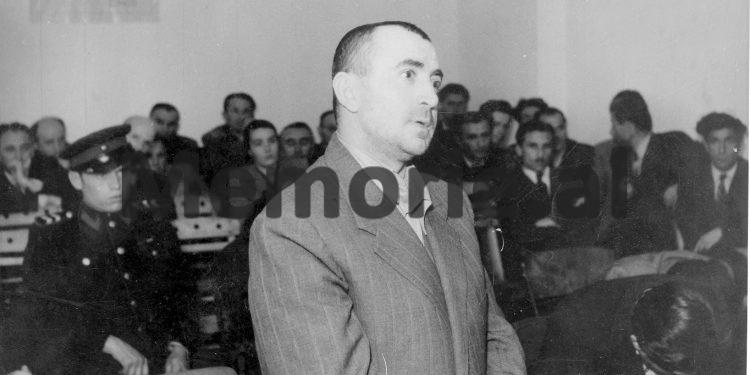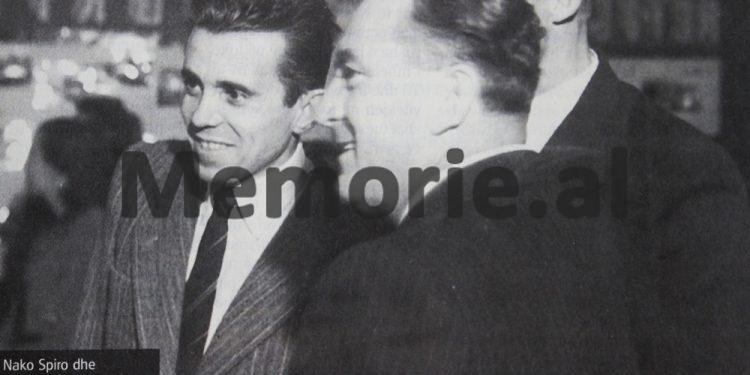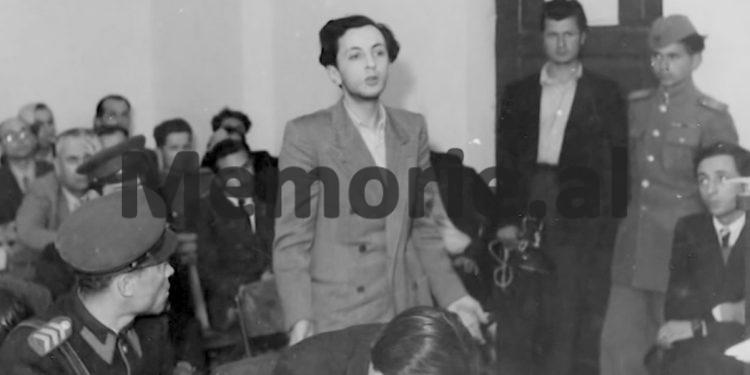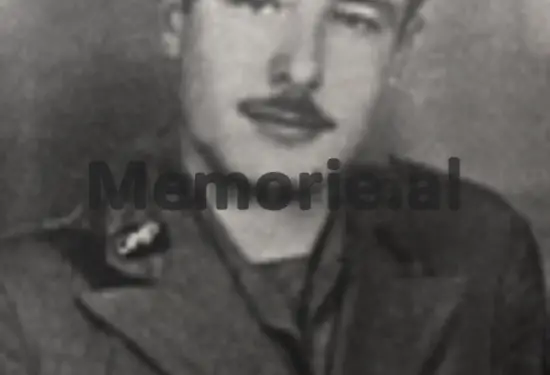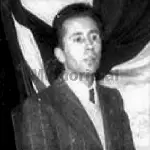By Gjergj Titani
The ninth part
Memorie.al / For the first time, we have been able to provide the witness account of many historical events. The conversation with Pandi Kristo, a senior figure of the Communist Party of Albania and the Albanian state, took place in Tirana, in the house of his son-in-law, Robert Vullkani, where he was forced to live, when he was released from exile, since the Albanian democratic state, never gave him a home. The regime, for which he fought, targeted him to liquidate Pandi Kristo, placing him in the group of Koçi Xoxes, convicted for “hostile activities”. For 42 years in a row, I would wander the prisons of the communist dictatorship and successive exiles, until communism was overthrown forever, at the beginning of the 90s. The interview was conducted in 1992 – 1993 and over the years, it was completed, according to the memories and family archive of Pandi’s daughter, Assembly Kristo (Vullkani), sister, veteran of the Anti-Fascist National Liberation War, his son-in-law, Robert Vullkani and the memories of many contemporaries. Here is Pandi Kristo’s confession.
Continues from the previous issue
Mr. Pandi, what about the other members of the “Koçi Xoxes Group”?
As I learned later, they were also arrested at the same time, but held in different places. As for us, we were arrested in a bandit way, not at all normal, on November 28, 1948, as I learned later. The official news, about our arrest, announced that; we were arrested on December 2 of the same year. As it is understood, an illegal arrest was made to us, which was announced five days late. Together with me and Koçin, Vaskë Koleci, a member of the Central Committee of the Albanian Communist Party, who at that time was the Deputy Minister of Internal Affairs, Nuri Huta, one of the main cadres of the Ministry of Internal Affairs, was arrested. Vango Mitrojorgji, head of State Security.
For these last three, I don’t know exactly where they were investigated and kept isolated, that is, detained, but I was convinced that they were in the same premises. They kept me in some villas that were residences of the Ministry of Internal Affairs. The investigation was mainly led by the Prosecutor General, Bedri Spahiu, and he insisted on getting regular processes from us. However, as it is implied, he insisted on proving the guilt of the charges. During the investigative process, one day Mehmet Shehu came, who, hitting me lightly on the temple of the head, told me that; I should have said what they wanted, and something else threatening, and it didn’t seem to me, because I asked for the suspension of the investigations and warned Bedri Spahiu that I would never accept anyone threatening me, let alone using physical violence.
Anyway, the Investigation continued with its violent methods, with physical and psychological pressures that are already known by many others and that I don’t want to remember today, in my old age. The final period of the investigations took place in the Old Prison, where we stayed in the so-called dungeons of Koçi Xoxes. They were windowless and ventilated through a dairy that was built right into their ceiling. My dungeon was close to that of Kochi. Through a hole in the wall, I don’t know by whom, I remember trying to communicate with him. I recognized Kochi from the voices coming from there. Xoxe, was very cautious and incredulous and only started communicating with me when I inserted my arrest warrant through that hole.
Another day, when I was going to the bathroom, in the corridor, as if by chance, I saw our friend, Stefo Grabocka, dressed in uniform, which apparently, the investigator had brought just so that he and I could see each other the other. My look was reprimanding for him. I wanted to tell Stefo that he should not be manipulated by the Prosecutor’s Office and the Investigation. In fact, that’s what happened. Stefo Grabocka, this militant of the Communist Group of Korça and the NPSH, an old communist and excellent professional, of our conspiracy, never violated his sincerity, honesty and loyalty to his old War comrades.
Who was commissioned by Enveri to investigate your “group”?
For this investigation and the further development of the trial, Enver Hoxha had entrusted Bedriu, who with his strictness and consistency, continued the process, in accordance with the direction he was assigned. It is worth noting that Bedri Spahiu would be one of the victims of Enver’s dictatorial processes and would be sentenced to 25 years in prison. In this shameful process, he would be in the dock, together with the wonderful Tuk Jakova, who after the First Congress, was elected to the post of Koçi Xoxes, that is, he performed the duties of Deputy Prime Minister of the country and Organizational Secretary of the Central Committee of the KPSH. Bedri Spahiu, in a large article in the Albanian press, after the overthrow of the dictatorship with the title, “Bedri Spahiu, revises Bedri Spahiu”, takes an excellent position and showed the extraordinary vitality and loyalty of his position, against the dictatorial regime of Enver Hoxha.
Thus, he denounced and rejected himself first, making a brilliant self-criticism, for that shameful, criminal process, directed and scripted by Stalinist-Enverist. I say that this article by Bedri, which was a model of self-criticism, self-accusation, and pretense, that he made to the hated regime installed by Enver Hoxha, Mehmet Shehu, Hysni Kapo, and their successors, was not echoed belonged to them. From here, the reversal of all fictions and distortions of Enver’s staged processes had to begin.
What do you remember from the court process?
The trial began on May 10, 1949, with the Chairman of the Investigative Commission and General Prosecutor, Bedri Spahiu, and members of the commission: Gaqo Floqin and Sotir Qiriakon. President of the Supreme Court, representing the Court of Fact, Frederik Nosin and its members, Vasil Trimčev and Niko Zoto. Our group, as I have mentioned, was called: “hostile, anti-popular and anti-Marxist”, and according to them, “with the help of Tito’s Trotskyist clique, it aimed to completely seize the leadership of the party and the state in its own hands”. The court concluded that; Koçi Xoxe and I were fully responsible for all the “distortions” that had been observed until then within the NPSH, we had separated the Party from the state and placed it completely under the control of the bodies of the Ministry of Labor Internal.
We were called Tito’s agents and spies, because we had created a wide espionage network, through which we informed the Yugoslav revisionists, with information of a comprehensive nature, about the internal political, economic and military situation of Albania. See, please, with coolness, what accusations the Court of Fact raised, it is enough to make a capital decision, satisfy the demands of “Father Stalin” and wash its hands once and for all, with the proletarian-worker core of the NPSH- of. The goal was clearer. Josif Broz Tito, who was one of the first to come out openly against the Stalinist dictatorship, had to be called an international agent and a blind tool of American and world imperialism.
Through this trial, which was the first in a series of tragic trials in Eastern Europe, such as that of Trajco Kostov, in Bulgaria, who was hanged in one of the central squares of Sofia, of Slanski, in Czechoslovakia, also rehabilitated, of Rajku , in Hungary, this one also rehabilitated, Patrashkan and others in Romania, Steinerberg and many others in the German Democratic Republic. All of these would bring a long twilight until the democratic days of the 20th Congress of the Communist Party of the Soviet Union erupted, what is in Albania, would never come, because the Enverist dictatorship ruled physically, practically, politically and ideologically, until the 90s, when the communist dictatorship was administratively overthrown. I ask: was the gloomy mentality that Enver Hoxha’s half-century dictatorship left was overturned? Did the deeply embedded mentalities of this dictatorship change? My answer is, unfortunately not. No way, no.
How did the court process take place?
This process, in its first days, was given a somewhat regular official character. The impression was created, as if after hearing the accusations, the defendants would be heard normally, but the opposite happened. When Koçi Xoxe denounced what had been done to him during his stay in the cell, he was interrupted several times and was not allowed to speak. In another case, when Koci requested that Enver Hoxha, Hysni Kapo, Gogo Nushi, Tuk Jakova, Manush Myftiu, Kiço Ngjela, Nesti Kerenxhi, Naxhije Dume, and he was given the opportunity to read the investigation report, to make the additions and remarks that the defendant must make, according to the provisions of the law, it is implied, the court made a ridiculous decision not to call the witnesses, since the circumstances that Koçi sought to clarify were sufficiently clarified by the development of the trial.
I remember that the Trial Panel justified Koç’s second request roughly like this, if I may be correct: “Since the defendant has given explanations and has had the opportunity to constantly make remarks and his findings, and after reading the minutes of more than 130 pages, does not serve the case”. This decision was approved by the majority of the Judiciary, but the other member of the court, Niko Zoto, did not approve, who said: “I am against the decision of the majority, for rejecting the right request of Koci, to read the investigative report, for the reason that the report of the Investigative Commission is the main evidence, which supports the accusation. Therefore, it should be given to the defendant to read and at the end, be asked if the defendant accepts it or not, and then remarks should be made, on those points he thinks”.
Even this request, so natural, so legal, proves once again the urgency of the directors of this staged process, to close it as soon as possible. After that, the President of the Trial Panel asked the General Prosecutor, the defendants and their defense lawyers, if they had anything else to expand the investigations, or not. The prosecutor maintained the claim by analyzing all fabricated evidence, he declared our guilt. Koçi Xoxe was sentenced to death by firing squad, I to 20 years, imprisonment and forced labor, Vaskë Koleci, to 15 years in prison, Nuri Huta, to 12 years and Vango Mitrojorgji to 7 years in prison and forced labor. On June 6, at five o’clock in the afternoon, the day was set to make the defense.
I want to add that Koçi Xoxe, despite his miserable physical condition, during the process, took notes and was prepared to defend himself. In the 12th session of the process, only I, Vangua and Nuriu appeared at the trial. At this time, the prosecutor stated that Koçi Xoxe had refused to appear in court, as well as to issue a written statement that he refused to appear in the last defense. The trial panel decided to forcibly bring Koçi to make the last defense and if he did not make a defense, to declare this before the trial panel. In the meantime, I saw with regret that after a while, Koçi Xoxen, was dragged, pushed by force and placed in the place of the accused. After that, he got up nervously and declared: “They brought me by force, I didn’t come by myself.”
Then, Frederik Nosi, told him that; The Jury decided to bring him forcibly and if he did not want to defend himself, he should declare it before them. Then, Koçi Xoxe, declared that he did not want to defend himself, as he did not trust the court and the lawyer and that the prosecutor had made a vile and false claim. He forbade the lawyer to speak on his behalf. Thanks to the long experience that I had, from the experience of previous persecutions, I did not speak for long, and I did not give explanations, but when I was asked about the VIIIth Plenum and its resolution, about which, as I have mentioned above , all the members of the Central Committee were of the same mind, I said that the documents of this plenum had been approved by all of them and that Koç was the flag bearer there.
I remember that Koçi stood firm and brave in court. When he was accused of monitoring Enver Hoxha and other friends, he did not accept anything like that, and he said that the interceptions, censorship, surveillance, pursuits, or shootings were always done with the approval of the Commander, so we, the General Secretary, said. Koçi declared in court that Enveri, contrary to what he says, or contrary to the accusations of the General Prosecutor, was never monitored. In the following, he strongly stated that:… Here I am seeing a conspiracy hatched against me and being revolted, in a written proof, which Bedriu presented to him, by means of a typewritten sheet, allegedly with the characteristics of the party leaders, Koçi declared: “You found this sheet with these characteristic notes, for the Party leaders, in the materials of the Bureau, when this problem was discussed, and not in the archives of the Ministry of the Interior, or the files of the State Security.
Therefore, I say that this is a big bluff and for five months I have not done anything other than what these investigators told me and imposed on me. All are slander, provocations. They subjected me to physical, mental and moral provocations, they left me tied hand and foot for about 2 months, and they put family pressure on me. This is a great shame. Frederik Nosi ordered Koçi several times to be cool-headed, and even told him that he should have respect for the judicial body, while Bedriu lectured loudly: “Look, friends, the face of betrayal. This is what Trotskyism means”.
When Bedri Spahiu concluded in his speech that Koçi Xoxe had not only surveilled the leaders and collected information about them, Koçi Xoxe declared: “This is slander, not with two horns, but with four. I ask that the trial be held, with open doors for the people to hear it”. When the prosecutor asked if there was duality between Enver and Koçi, duality of party-power and others, Koçi denied this and insisted on an open trial, in front of the people. Then, the General Prosecutor requested that Koçi Xoxes be deprived of his right to speak and that the request not be taken into account, which the Trial Panel unanimously approved. It was at this time, Xoxe declared that he would not speak anymore, but would accuse.
How do you remember the years of prison and political persecution?
While Koçi Xoxe was shot, I was sent to the Old Prison of Tirana, the New Prison, the Craft Prison in Tirana, and Burrel. In 1949, together with Vaskë Kolec, Musine Kokalari, and another woman, whose name I do not remember, we were sent to the prison regime, in Burrel. At that time, massive provocations took place on the state border with Greece. I stayed in Burrell prison for a long time. The command and the convicts behaved correctly with me. In 1963, I was released from prison and came to be near my family, which was still in Tirana.
After a month, by the decision of the infamous deportation-internment Commission, on November 5, 1963, I was deported from Tirana to Lushnjë, where I worked in the Handicraft Cooperative, in my old profession of shoemaker. As if it wasn’t enough, all that long time of persecution, in the first months of 1983, I was first called to the Lushnja investigation, and then to the central one, and they asked me intensively about Mehmet Shehu and they wanted me, I would turn him out to be a traitor, an agent, a poly-agent, a trained spy of imperialism. I told them only two words: “Enver Hoxha is alive.” Ask him why he kept Mehmet Shehu, prime minister, for so long. I have nothing to say.”
The other insistence of the investigation was: Why in the process of Koçi Xoxes, they arrested you and not his deputy who was Nesti Kerenxhi? Of course, I understood immediately that after the murder of Mehmet, a process had begun, one of the largest and most complicated that had ever happened in Albania, and that Nesti Kerenxhi had been arrested. Perhaps, together with his wife, Naxhija. Still angry, but restrained, I told him: “You still have the architect of that rigged process alive. Ask him to tell them all the details what do you think, that today, after 40 years, you want to make excavations and discoveries on that process”?! That’s it, I told them and begged them to leave me alone in my old age. Later, with a special decision of the above commission, on May 11, 1983, I was interned as a family in Čerma in Lushnje.
In exile, as far as I know, you also lost your dear wife, what do you remember from that painful event?
On January 7, 1984, I lost my wife, my lifelong friend, who we had experienced together, all the hardships of the War, the post-war and the long and heavy persecution that made us fish, that Party, which we created with our labor and blood, which did not already exist. My wife, Dhora, for a long time, was hospitalized and treated by a chronic reformer, but the all-powerful one of the Čerma area, Bujar Peza, a real monster, who has fallen on the necks of political persecutors systematically; it did not even allow him to be treated regularly in the hospital. Do you think how difficult I felt when I had no way to transport the woman to the cemetery, because I didn’t want to implicate anyone?
Under these conditions, I notified the head of the Department of Internal Affairs, who probably knew the misfortune that had happened to me, and I told him that the deceased had been in the middle of the house for a long time and we had no way to bury her. Then, he sent four employees of the State Security and thus, the traditional burial rite of an ordinary man became possible. When Enver Hoxha died, I was extremely happy, but it didn’t occur to me that the criminal, Bujar Peza, would organize and order the school children to throw stones at me and make fun of me in the streets of the village. Imagine the difficult situation I was in, when I had to appear twice a day, in the morning and in the afternoon, in the torturous ritual of the appeal of political exiles. It took the energetic denunciation of the girl, in front of him and in all instances of the Ministry of Internal Affairs, to stop that dirty persecution organized by the diligent operative of the area.
When did you return to Tirana?
On May 11, 1993, I was released from exile and came to Tirana. First at my sister Vangjeli’s house, and then at my son-in-law’s house. I am not talking at all about the strange time that was created then in Tirana and the main cities of the country, because these are moments that everyone knows. I would speak with pathos about those days, but I do not believe that there is any special interest in my thoughts of those days. If I have the opportunity, I will summarize my memories in a book with the title: “Judgments of a bureaucrat”, where I will express in a more extended and, more studied way, and my thoughts about the communist movement in Albania. , the creation of the Korça Communist Group and the Albanian Communist Party, the Anti-Fascist National Liberation War, and those four years after the war, when we were in leadership, the arrest, the trial, the prison, the exile, the release, and others.
But let’s leave the dreams, continue our conversation. Now, the tragicomedy didn’t end there, because one fine day, when the youth and people of Tirana blew up foreign embassies, by order of the Lushnja Department of Internal Affairs, a “GAZ” type car comes in front of my house, from what all our people knew well what they were, and he takes me back to exile in Çerma, without giving me any explanation. This is where the biggest paradox occurs. My daughter, Assembly, comes and forcibly took me from Čerma, brought me to Tirana. No one asked about me again, no one knocked on the door of the house, no one ever asked if I was alive or not. Finally two more happy days had come for me old man. I started seeing friends, even the best ones. I also started visiting them, despite my old age and being very tired, after that long persecution.
Those days were some of the most beautiful and peaceful of my life. There were no more prison guards, dungeon policemen, zone commanders, and branch chiefs, timed and untimed investigators. I met with love my grandchildren, my sister, and I spoke on the phone with my people who began to disperse, like migratory birds around the world. Strange times had come. I rejoiced immensely at the demolition of the dictator’s monument and the removal of other symbols that reminded us of the past and for which we had fought so hard, but to be honest, I did not and do not have any respect and love, because to our generation and the younger ones, those symbols caused great pain. Memorie.al
The next issue follows




